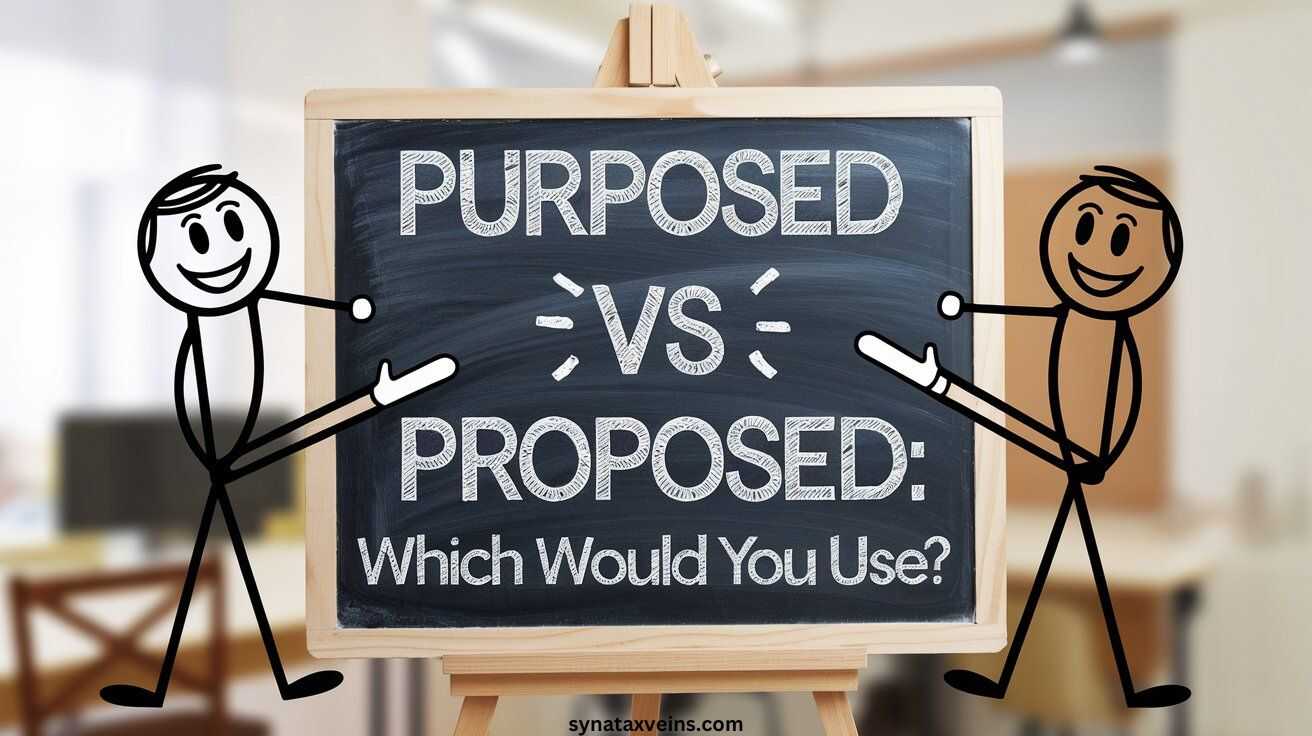Choosing between purposed vs proposed can be tricky. Many people confuse these words because they sound similar, but their meanings and usage are completely different. Using the wrong word can change the entire meaning of a sentence, leading to misunderstandings.
This guide will explain the key differences between these words with simple definitions, examples, and grammar rules. By the end, you’ll have a clear understanding of how to use them correctly in daily communication.
What Does “Propose” Mean?
The definition of propose is to suggest an idea, offer a suggestion, or put forward a concept. It is a verb that means to present something for consideration.
Propose Usage in Different Contexts:
- Business – “I want to propose a new idea for our next project.”
- Marriage – “He finally decided to propose marriage to his girlfriend.”
- Meetings – “Can I propose something new for the team discussion?”
💡 Grammar Rule: “Propose” is always an action word and is usually followed by an idea, plan, or question.
What Does “Purpose” Mean?
The definition of purpose is the reason for something, the intention behind an action, or the goal of an activity. It is mostly used as a noun but can also be a verb.
Purpose Usage in Different Contexts:
- Life Goals – “The purpose of something is to give it meaning.”
- Business – “The purpose of a meeting is to discuss progress.”
- Education – “The objective of learning is to gain knowledge.”
💡 Grammar Tip: “Purpose” as a noun means goal; as a verb, it means to intend something (though this is rare).
Key Differences: Propose vs. Purpose
| Feature | Propose | Purpose |
|---|---|---|
| Part of Speech | Verb | Noun (sometimes verb) |
| Meaning | Suggest an idea, recommend something | Goal, intention, or reason behind something |
| Example | “She proposed a business idea.” | “The purpose of this project is innovation.” |
| Usage | Action (suggesting something) | Explanation (giving a reason) |
📌 Main Differences:
✔ “Propose” is an action (suggestion).
✔ “Purpose” is a reason (intention).
Proposed vs. Purposed: What’s the Difference?
People often confuse proposed vs. purposed, but they have different meanings:
- Proposed → Past tense of propose (suggested something).
- “The manager proposed a salary increase.”
- Purposed → Less common; means intended or planned.
- “The team purposed to complete the project on time.”
📌 Grammar Rule: “Proposed” is widely used, “purposed” is rare in modern English.
Purposed vs. Proposed Meaning
- Proposed = Something offered, suggested, or recommended.
- Purposed = Something intended or planned (but not common in speech).
Example:
✔ “She proposed a new marketing strategy.” (suggested)
✔ “He purposed to finish the work early.” (intended)
Purposed vs. Proposed Synonym
Here are some alternative words for both:
For “Proposed”
✔ Suggested
✔ Recommended
✔ Put forward
✔ Presented
For “Purposed”
✔ Intended
✔ Aimed
✔ Planned
READ MORE >>> Longterm or Long-term: What’s the Difference?
Purposed vs. Proposed Examples
Choosing between purposed and proposed can be confusing because they look similar, but their meanings are different. “Proposed” refers to something that was suggested, recommended, or put forward, while “purposed” means something that was intended or planned (though it is rarely used in modern English).
Using the wrong word can make your sentence unclear. Below are real-life examples from business, relationships, and job applications to help you understand the correct usage of each word.
Example 1: Business Proposal
- “The CEO proposed a business plan to investors.”
- “The company purposed to expand into new markets.”
Example 2: Marriage Proposal
- “He proposed marriage with a beautiful ring.”
- “The couple purposed to get married next year.”
Example 3: Job Application
- “She proposed a new role for herself in the company.”
- “His purposed career move didn’t happen.”
Purpose vs. Propose in an Email
Using the right word in emails is important for professional communication.
Email Example 1: Business Proposal
📧 Subject: Proposal for a New Project
“Dear [Name], I would like to propose a new idea for our marketing strategy…”
Email Example 2: Wedding Proposal
📧 Subject: Planning a Wedding Proposal
“Hey [Friend], I’m planning to propose marriage next month and need your help…”
Purpose Meaning in Hindi
The meaning of purpose in Hindi is उद्देश्य (Uddeshya).
- Example: “What is the purpose of something in life?” → “जीवन का उद्देश्य क्या है?”
Pronunciation of Purpose
📢 Correct Pronunciation: /ˈpɜːrpəs/
- Syllables: Pur-pose
- Tip: The “r” sound is soft, and the second syllable is short.
Purposed or Proposed Marriage: Which Is Correct?
Only “proposed marriage” is correct when talking about engagement.
✔ “He proposed marriage to her on the beach.”
✖ “He purposed marriage to her.” (Incorrect)
How to Purpose a Girl?
If you’re wondering how to purpose a girl, you might actually mean how to propose to a girl. Many people mistakenly use “purpose” instead of “propose” when talking about asking for marriage. The correct phrase is “propose to a girl”, not “purpose a girl”.
Steps to Propose a Girl for Marriage:
- Know Your Purpose – Understand the goal of proposing. Are you ready for a lifelong commitment?
- Plan the Proposal – Choose a meaningful place and think about how you will propose something romantic.
- Get the Ring – A wedding proposal usually involves a ring, but a heartfelt speech matters more.
- Express Your Feelings – Tell her the reason for your love and why you want to spend your life together.
- Ask the Question – The moment she’s been waiting for: “Will you marry me?”
- Respect Her Answer – Whether she says yes or no, accept her response with respect and understanding.
💡 Tip: A successful engagement proposal comes from the heart. Focus on meaningful words, sincerity, and creating a special memory.
How to Purpose a Boy?
If you’re searching for how to purpose a boy, you likely mean how to propose to a boy. Like before, the correct word is “propose,” not “purpose.”
Best Ways to Propose to a Boy:
- Understand His Feelings – Before you propose marriage, make sure he’s ready for this step.
- Choose a Unique Setting – A romantic proposal can happen at a place that holds meaning for both of you.
- Keep It Personal – Whether it’s a formal proposal or a simple moment, say something meaningful.
- Use the Right Words – Instead of a grand speech, tell him the purpose of your relationship and why you want to spend forever together.
- Present a Symbolic Gift – While a ring is traditional, you can also choose something special that represents your love.
- Ask with Confidence – Look into his eyes and ask, “Will you marry me?”
💡 Tip: A marriage proposal doesn’t have to be extravagant. What matters most is honesty, love, and a shared vision for the future.
Final Thought: Whether you’re proposing to a boy or girl, using the right word is just as important as the moment itself. Always say “propose,” not “purpose,” when talking about engagement! 💍❤️
Frequently Asked Questions
What Does Purposed or Proposed Mean?
- Purposed means something was intended or planned, but it is rarely used in modern English.
- Example: “He purposed to finish his work early.” (intended)
- Proposed means something was suggested or put forward for consideration.
- Example: “She proposed a new idea in the meeting.” (suggested)
📌 Key Difference: “Proposed” is commonly used, while “purposed” is outdated and uncommon.
What Is the Difference Between Proposed and Proposed To?
- Proposed means suggested an idea, plan, or action.
- Example: “The manager proposed a new strategy.”
- Proposed to is used specifically in the context of marriage or engagement.
- Example: “He proposed to his girlfriend last night.”
📌 Grammar Tip: If you’re talking about a business proposal, project proposal, or suggestion, just use “proposed.” If it’s about asking someone to marry, use “proposed to.”
When to Use Proposed?
Use “proposed” when you want to talk about something that was suggested, offered, or recommended.
✔ Correct Usage Examples:
- “She proposed a new policy for the company.”
- “The law was proposed in the Senate.”
- “He proposed to his girlfriend on Valentine’s Day.”
📌 Main Usage: Business, formal suggestions, project planning, or marriage proposals.
What Is the Difference Between Purposed and Purposeful?
- Purposed (rare) → Means something was intended or planned.
- Example: “She purposed to become a doctor.” (intended)
- Purposeful → Means something is full of meaning, intentional, or done with a clear goal.
- Example: “He gave a purposeful speech about leadership.” (meaningful, intentional)
📌 Key Difference: “Purposeful” is commonly used, while “purposed” is mostly outdated.
What Is Purposive vs. Purpose?
- Purposive → Means something is done with a specific goal in mind (often used in academic and legal contexts).
- Example: “The research followed a purposive approach.”
- Purpose → Means the reason, goal, or function of something.
- Example: “The purpose of something is to give it meaning.”
📌 Main Difference: “Purposive” describes an intentional approach, while “purpose” describes the reason behind something.
What Does Purposedly Mean?
“Purposedly” is incorrect. The correct word is “purposefully” or “purposely.”
✔ Purposefully → Means with intention, with a clear purpose.
- Example: “She spoke purposefully during the meeting.”
✔ Purposely → Means on purpose, not by accident. - Example: “He purposely ignored the question.”
📌 Key Tip: Avoid using “purposedly.” Use “purposefully” or “purposely” instead!
Conclusion
Understanding purposed vs proposed is essential for clear and effective communication. While proposed means suggested, recommended, or put forward, purposed (rarely used) means intended or planned. In modern English, “proposed” is the correct choice in most situations, especially for business proposals, project planning, and marriage proposals.
Using the right word enhances writing skills, grammar accuracy, and communication clarity. Always double-check your choice based on the context and meaning. Whether you’re drafting a formal proposal, suggesting an idea, or planning a romantic proposal, choosing the right term makes all the difference! 🎯

